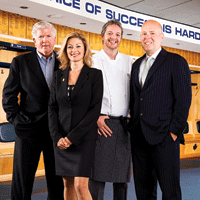When it comes to offering a unique dining experience, the MLSE team scores big
It’s been almost 45 years since the Maple Leafs iced a winning hockey team, a fact not easily lost on Torontonians. Ironically, however, in a matter of a few short years, Maple Leaf Sports & Entertainment (MLSE), the corporate behemoth that owns the Leafs, the Toronto Raptors, Toronto FC, the Air Canada Centre, and a host of other enterprises, has become a model of successful entrepreneurship. By assembling a dream team of culinary playmakers, and focusing on innovative offerings and leadingedge customer service, MLSE has created a winning recipe for success, while proving that foodservice — even within the usually staid stadium environment — need not be predictable or boring.
When the ACC opened to much fanfare in 1999, it marked a new beginning for the Maple Leafs, Raptors and the foodservice team that feeds the fans and players. Led by Richard Peddie, president of MLSE, there was a new directive to create a fullservice entertainment space for the city’s loyal fans. “He was the one with the vision,” says Michael Doyle, vicepresident, F&B.* “He saw what could happen; he just didn’t know how to get there.”
Enter Doyle. The former Disney employee arrived on the scene in 2001 to help take F&B to a new level. “When we opened the building I spent the first five years getting people in place to be able to consistently serve 20,000 people a night — and to do it well,” recalls Doyle, noting the challenges of “having 15minute intermissions to try to feed everyone.”
Fast forward to 2011, and Doyle and his team have taken Peddie’s vision and made it a reality, fuelling the company’s recent culinary hits, including Real Sports Bar & Grill (RSBG), E11even and several new concession kiosks.
After scouring North America, researching what makes an amazing sports bar, the team came to the same conclusion: “The food was horrible in all of them,” quips Doyle. Deciding that excellent food would be a pillar of its success, the team set out to create something that would stand apart from the other bars. It’s done just that. The finished product is a 900seat sports bar unlike any in the country. The impressive menu of quality offerings made from scratch features such fan favourites as beerbraised baby back ribs ($24) and Chef Tony’s Ultimate wings in 11 varieties ($24.99).
Real Sports also highlights unique design elements such as hightop tables made from hardwood reclaimed from Air Canada Centre’s basketball court, a chandelier made of hockey sticks and TVs placed strategically at every banquette. And, it features a private dining room, too.
Opening in June 2010, RSBG was an overnight success, quickly becoming the highestgrossing restaurant in the city. Within its first year of business, it was voted the Number 1 Sports Bar in North America by ESPN, and, last year, it was ranked the number1 stadium arena with the highest level of food safety. Not surprisingly, sales are through the roof, growing by 35 per cent in the past year.
While the food has been lauded, the restaurant’s unique design elements create that special “wow” factor. Nearly 200 HD TVs are on display throughout the 25,000squarefoot space, while a gigantic twostorey 39foot HD TV, the largest in North America, makes guests feel as though they’re in the middle of the ice action.
And, since MLSE owns the teams, and the building they play in, the company is able to fuel change seamlessly. “There’s no one governing us, so that gives us a lot of autonomy,” says Robert Bartley, senior culinary director and executive chef, MLSE. But, it’s the fanfocused operating style that sets the arena apart. “We listen to what our fans want, and that’s not the driver of the business unit in most other stadiums; it’s ticket sales,” says the chef.
Certainly, as any Torontonian knows, what Leaf fans really want is a winning hockey team. “We can’t control what goes on the ice or on the court, but we can control the experience,” quips Bartley, pointing to the success of RSBG, located strategically in Maple Leaf Square, an area that now houses a mixeduse hotel/condo development and serves as a gathering place for fans to congregate before and after games.
As expected, RSBG buzzes with energy on game nights, but even company execs are blown away by its other victories. “Our busiest days are not our event days; they’re Sunday NFL football, and Monday night football is huge,” marvels Doyle. “We had our biggest crowd ever during the UFC 129 night. [RSBG seated 2,357 people within 15 hours of service and made $182,000, the largest event day sales to date.]”
The bar has also become a hot destination for lunch; surprisingly it doesn’t just appeal to men. “We have food women like,” explains Doyle, and it doesn’t feel like a typical sports bar. “Torontonians also like to show off the restaurant to outoftown guests. We’ve become one of the biggest tourist destinations,” laughs Doyle.
While RSBG is a huge success, last year, MLSE launched E11even, an eatery Bartley defines as upscalecasual. “We wanted to create a pregame destination for fans,” says Bartlely, a place for excellent food and great service at affordable prices.
Certainly the restaurant’s adjacency to Le Germain Hotel means it’s also a great location for hotel guests. “It’s definitely an amenity for the hotel,” says Bartley, adding it’s a concept MLSE hopes to one day expand throughout the city.
Earlier this year, in an effort to replicate its success, MLSE’s F&B team took RSBG to BMO Field, home of the Toronto FC of the MLS League. In addition to highlighting popular dishes such as beefbrisket sandwich, chickenandblackbean empanadas and Tuscan porchetta sandwich, the team also introduced the RSBG BBQ Pit, a huge success, which produced record openingday sales.
On the concession side, the company launched the hugely popular Burkie’s Dog House, bringing the total number of kiosks to 100. The hotdog stand, named after GM Brian Burke, features 11 different dogs, including one that’s bacon wrapped, a chili dog and a poutine wiener. “We took the idea of a good hotdog and focused on how we could make it better, playing on the idea that you don’t want to be in Burkie’s dog house.”
The goal is always to offer premium products. “It’s all about selling entertainment. Our tickets are expensive, so it wouldn’t make sense to have a $2 hotdog that’s not worth eating. Our goal is to get the best possible product, and, to do this, we have to constantly push our suppliers,” says Bartley. “I get so many calls from suppliers pushing us to buy processed food because it saves labour costs and because most stadiums are bottomline driven, but that’s not what we are. We’re the exact opposite: we believe we’re going to make a profit by giving fans quality products, so we prefer to make a lot of product ourselves.”
Not only does Bartley oversee a team of three topnotch executive chefs (Tony Glitz, RSBG; Graham Powell, E11even; and Chris Zielinski, ACC) he’s also forged relationships with other top Toronto toques. Earlier this year, for example, MLSE entered into a strategic partnership with culinary icon Jamie Kennedy to sell his famous fries in the concession area, a product now complemented with the company’s recent introduction of “Bart’s Burgers,” aptly named after Bartley himself. “Hamburgers haven’t traditionally been stadium food, but we think we’ve got a home run,” enthuses the downtoearth chef. “Every year, we try to push the envelope. We don’t like to think of ourselves as cutting edge, we’re leading edge.”
Of course, Bartley credits staff as a big reason for its success. With a team of more than 60 fulltime managers/directors and more than 1,500 parttime staff, MLSE is dedicated to providing topnotch customer service. “We invest heavily in training and the actual recruitment. We always hire for attitude, and then we train for skill,” says the affable toque who learned the service ethic while executive chef of the Four Seasons Yorkville.
Last year, MLSE made headlines when its sommelier Jennifer Huether received the Master Sommelier designation. She’s one of only three people in Canada to earn the distinction — and the only woman. “When I was hired I was the only sommelier here,” recalls Huether, who today leads a team of 11 sommeliers. “We have the largest team in Canada, but, more importantly, we have a professional, progressive, dynamic and educated team that works very well together.”
With a Master Sommelier at the helm, the company boasts one of the best wineandbeverage training programs in the country. It’s mandatory, for example,f or its servers, bartenders and managers to go through
a minimum of the firstlevel sommelier program. But you wouldn’t necessarily expect a stadium — with a restaurant that features 112 taps pouring 36 different beers, and two tables where customers can dispense their own beer via a Belgiandesigned draft tower — to boast one of the largest wine programs in North America, featuring more than 600 different labels and an impressive bytheglass program.
With technology continuing to play an important role in business, restaurant patrons at E11even were the first in Canada to choose their wines through iPads. It was an instant success, organizing information and making wines searchable by region, vintage, price and producer. “It’s been labour intensive, but, at the end of the day, the fans are enjoying it,” says Huether.
So now, the question on everyone’s mind is what’s next? “Our intent and our plan always was we’d really love to take RSBG across Canada,” says Doyle. “Our Board has given us the approval and the money to open a second RSBG in Ottawa, and then we have three or four other sites planned in Ontario [Vaughan, London and Mississauga].” The company is also looking to expand into Vancouver, Edmonton and Winnipeg.” And, earlier this year, MLSE launched Real Sports in the stadium by introducing a RSBG kiosk with a modified menu.
If that’s not enough to keep MLSE execs busy, the company is also looking at developing or buying a TV food channel. Doyle says it’s natural given the various food elements under the company umbrella. “We can create some cool content,” he says. Future considerations include the possibility of taking over F&B at various convention centres in and around downtown Toronto.
With so much going on, it’s hard to fathom how the MLSE team finds time to donate to a host of charitable causes; but being a leader in the community is integral to the company’s core values.“We set out different programs to enable our people to get involved in the community in the way they want to or to join forces in the groups we’re involved.”
One of MLSE’s charities is its Team Up Foundation, which strives to improve the lives of youth by building facilities such as ice rinks, basketball courts and soccer pitches. “As a sports franchise,it’s important to promote youth to be in sports. Not only is it an outlet for exercise, it’s great to be part of a team. We also work closely with Habitat for Humanity to build homes, whether it’s in Toronto or in places like New Orleans. Each year we’ll pick an area where we want to give back,” says Doyle. All told, the company donates more than $3million annually to charities.
Though it promotes varied offerings, the MLSE team is driven by common goals. “Other organizations might have mission statements, but no one lives it like us,” Bartley explains. “Every question staff has can be answered by the company’s ‘visions and values.’ Richard Peddie created [them] two years ago, and he’s the biggest champion of them by far. He’s not just its prophet, he makes us accountable.” At the end of the day, “We’re a business and obviously we have to make a profit. But it’s not really about ego, and it’s not about money, it’s about giving fans what they want.”
Now, if only there was a way to give those fans a Stanley Cup.
*EDITOR’S NOTE: Just as this story was finalized and in production, F&H learned that Michael Doyle had left MLSE to pursue new opportunities as VP of the Vancouver Canucks hockey team. With company president Richard Peddie’s imminent retirement, MLSE is preparing to enter another period of development.
photo courtesy of Margaret Mulligan
More in Feature Articles
Kicking it Up a Notch: How to Add a Modern Twist to Traditional Italian Food
Making it Big: Extreme Brandz Takes the Lead
The C Factor: Chef Clark Champions the Canadian Seafood Industry
Hot Spot: Profiling Vancouver’s White Spot Resto
House Rules: Profiling Paul Rogalski and Olivier Reynaud of Rouge
The Elephant in the Room – Ventilation and Exhaust Systems
Rise Up: Canadian Wines Shine on Restaurant Menus
Russo Rising: Profiling Chef Russo





















